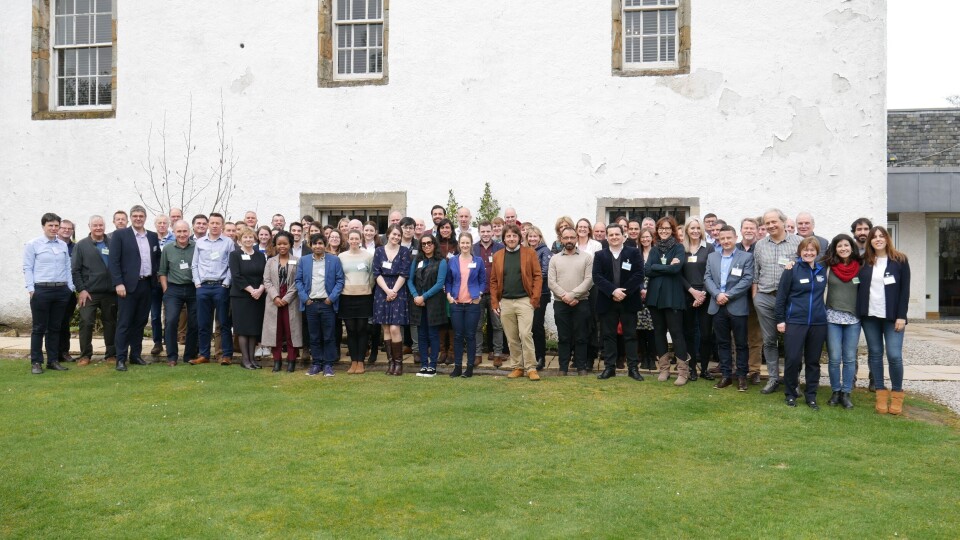
Worries of supermarket backlash over antibiotic use
Public worries about the resistance of bacteria to antibiotics could prompt supermarkets to shun fish that have been treated with drugs that remain vital for farmed animal welfare, fish vets have been told.
The issue of antimicrobial resistance (AMR) and how it is perceived by the public and retailers was a central topic on the first day of the Fish Vet Society’s annual conference held at Uphall near Edinburgh yesterday.
Speaker Amy Jackson, of the Responsible Use of Medicines in Agriculture Alliance (RUMA), said the jury was still out on whether misuse of antibiotics by human patients or on animals was to blame for AMR but said that was largely irrelevant, as perception mattered more.

Must engage
She said there was an extremely strong political will to act on AMR, and that the veterinary community must engage in the debate.
“Retailers can de-list items if public opinion is against it,” she warned. Agriculture [including aquaculture] must be transparent and accountable to regain control of the argument.
Jackson listed RUMA’s efforts to continue reducing antibiotic use while still ensuring the drugs were available when required. Its three aims are:
- Better and clearer communication: this has included the setting up of a taskforce to identify species-specific targets;
- Engage and act: the industry and vets must show it has nothing to hide in use of drugs;
- Set targets for the future: an initiative which has attracted unprecedented cross-sector support.
“We can’t afford to take our foot off the pedal,” said Jackson, who pointed to a consultation by the European Medicines Agency’s Antimicrobial Advice Ad Hoc Expert Group (EMA AMEG) which is looking at limiting the use oxolinic acid.

‘Built around welfare’
Talks on AMR were also given by Stirling University academics Andrew Desbois and Francis Murray.
In the afternoon session, under the title Vaccination and Preventative Strategies, delegates heard from Iain Berrill of the Scottish Salmon Producers’ Organisation (SSPO), who outlined how prevention was being used as a growth strategy.
Asked after his presentation how the SSPO was working to ensure social acceptability of farmed salmon, he pointed to the various accreditation schemes used by fish farmers and the SSPO’s Code of Good Practice, which was “built around fish welfare”.
But he also expressed concern about retailers “using antibiotic use as a marketing tool”.

Vaccination
Other speakers in the afternoon session included Ben North, of Pharmaq/Zoetis, who gave a global picture of fish vaccination.
Ana Silva, of Elanco, and Rosa Merino, of HIPRA, both outlined vaccine trials where fish had been challenged with disease.
Jamie Dawson, of Benchmark, gave an update on the company’s CleanTreat system, which cleans water used for wellboat bath treatments of salmon.
Dawson said the system, developed at the company’s research centre at Ardtoe, Ardnamurchan, could remove 15 different medicines and work is ongoing to increase that number.
Trials are still taking place with the system in Norway.
Mapping project exanded
Camilla Wilson, of MSD Animal Health, concluded the afternoon session with a talk on a number of the company’s developments.
She said MSD’s pancreas disease mapping project, which highlighted which strains of the virus were prevalent in different areas of Scotland, would soon be extended to include other diseases. The mapping allows farmers to decided whether to vaccinate against diseases based on what’s prevalent in their area.
MSD also aims to license the sedative Isoeugenol, acquired with the recent purchase of a Norwegian company, for use in the UK, said Wilson.
The conference concludes today, when subjects include Mowi Scotland’s fish health chief Meritxell Padrisa talking about outbreaks of Pasteurella skyensis in Atlantic salmon.























































